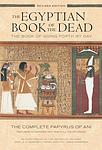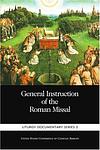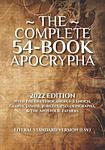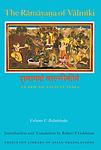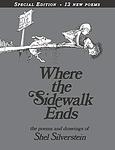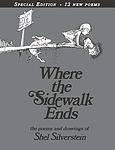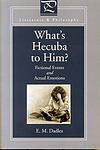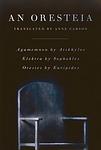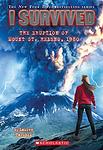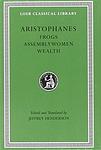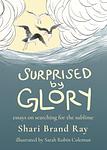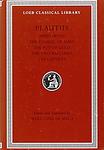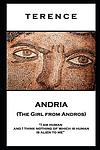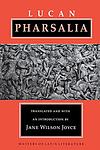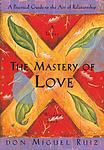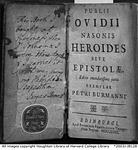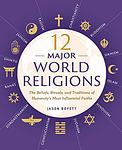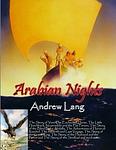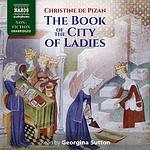Harold Bloom's The Western Canon
This is one of the 284 lists we use to generate our main The Greatest Books list.
-
Epic of Gilgamesh by Unknown
This ancient Mesopotamian epic follows the story of Gilgamesh, a demigod king who rules over the city of Uruk. Unhappy with his reign, the gods create a wild man named Enkidu to challenge him. However, Gilgamesh and Enkidu become close friends and embark on several adventures together, including defeating the demon Humbaba and killing the Bull of Heaven. After Enkidu's death, Gilgamesh becomes obsessed with finding immortality, leading him on a journey to meet Utnapishtim, the only human who has been granted eternal life. The narrative explores themes of friendship, mortality, and the meaning of life.
-
Egyptian Book Of The Dead by Unknown
The text in question is an ancient Egyptian funerary text consisting of spells, prayers, and incantations intended to guide the deceased through the afterlife. It contains detailed instructions for the soul's journey past various obstacles, with the ultimate goal of reaching the afterlife and achieving eternal life. The spells are designed to protect the soul from evil forces, ensure the continuation of life after death, and maintain harmony with the gods. This collection of texts highlights the Egyptians' beliefs about the importance of the afterlife and the complex rituals associated with death and burial practices.
-
The Bible by Unknown
The Bible is the central religious text of Christianity, comprising the Old and New Testaments. It features a diverse collection of writings including historical narratives, poetry, prophecies, and teachings. These texts chronicle the relationship between God and humanity, detail the life, death, and resurrection of Jesus Christ, and follow the early Christian church. Considered divinely inspired by believers, it serves as a foundational guide for faith and practice, influencing countless aspects of culture and society worldwide.
-
The Apocrypha by Unknown
"The Apocrypha" refers to a collection of ancient Jewish writings that are included in some versions of the Bible, particularly in the Septuagint and the Latin Vulgate, but are not considered canonical by all Jewish and Christian traditions. These texts include a variety of genres such as historical narratives, wisdom literature, additions to canonical books, and apocalyptic visions. They provide valuable insights into Jewish thought and practice during the Second Temple period and are revered in some Christian denominations for their historical and spiritual significance, despite their varying levels of acceptance across different religious communities.
-
Sayings Of The Fathers by Unknown
"Sayings of the Fathers" is a compilation of ethical teachings and maxims from Jewish sages. This text, part of the Mishnaic tractate of Pirkei Avot, serves as a guide to personal development and spiritual growth. It emphasizes the importance of character, humility, learning, and the pursuit of justice, offering wisdom that has been influential in Jewish thought and beyond. The sayings encapsulate the essence of moral conduct and provide insights into leading a life that balances worldly concerns with spiritual aspirations.
-
Mahabharata by Vyasa
The book is an English translation of the ancient Indian epic, originally written in Sanskrit, which tells the story of a great war that took place between two groups of cousins, the Kauravas and the Pandavas. The narrative explores themes of duty, righteousness, and honor while also featuring a rich array of gods, goddesses, and supernatural beings. It is not only a tale of war and conflict, but also a profound philosophical and spiritual treatise, containing the Bhagavad Gita, a sacred text of Hindu philosophy.
-
Bhagavad Gita by Unknown
The book is a 700-verse Hindu scripture that is part of the Indian epic Mahabharata. It takes the form of a dialogue between Prince Arjuna and the god Krishna, who serves as his charioteer. On the battlefield of Kurukshetra, just as the war is about to begin, Arjuna is filled with doubt and moral dilemma about fighting in the battle. Krishna imparts spiritual wisdom and guidance to Arjuna, addressing his concerns and leading him through a profound discourse on various philosophical concepts, including the nature of life, the soul, and one's duties. The text covers topics such as righteousness, devotion, and the paths to spiritual liberation, ultimately encouraging Arjuna to rise to his duty as a warrior with the understanding that the true self is eternal and beyond physical conflict.
-
Ramayana by Valmiki
The book is an ancient Indian epic poem which follows the journey of Prince Rama as he embarks on a quest to rescue his beloved wife Sita from the clutches of Ravana, the demon king. The narrative explores themes of morality, dharma (duty/righteousness), and the struggle between good and evil. The story is not just about Rama's battle against Ravana, but also his spiritual journey and the importance of upholding one's duties and responsibilities.
-
The Iliad by Homer
This epic poem focuses on the final weeks of the Trojan War, a conflict between the city of Troy and the Greek city-states. The story explores themes of war, honor, wrath, and divine intervention, with a particular focus on the Greek hero Achilles, whose anger and refusal to fight have devastating consequences. The narrative also delves into the lives of the gods, their relationships with humans, and their influence on the course of events.
-
The Odyssey by Homer
This epic poem follows the Greek hero Odysseus on his journey home after the fall of Troy. It takes Odysseus ten years to reach Ithaca after the ten-year Trojan War. Along the way, he encounters many obstacles including mythical creatures, divine beings, and natural disasters. Meanwhile, back in Ithaca, his wife Penelope and son Telemachus fend off suitors vying for Penelope's hand in marriage, believing Odysseus to be dead. The story concludes with Odysseus's return, his slaughter of the suitors, and his reunion with his family.
-
Works and Days by Hesiod
"Works and Days" is an ancient Greek epic poem that provides advice on life and farming. The author uses the myth of Prometheus and Pandora to explain why life is hard for humans, attributing it to Pandora's release of evils into the world. The work serves as a farmer's almanac, giving detailed advice on the best times to plant and harvest crops, and also provides moral guidance, emphasizing the importance of hard work, justice, and piety.
-
The Theogony by Hesiod
"The Theogony" is an ancient Greek epic poem that explores the genealogy of the gods. The narrative begins with the primordial deities Chaos, Gaia, and Eros, then progresses through the generations of Titans, Olympian gods, and mortal heroes. It provides an account of the struggles and power dynamics among these divine beings, culminating in the reign of Zeus as the king of the gods. The poem is a significant source of Greek mythology and offers insights into the ancient Greeks' worldview and their understanding of the universe's origins.
-
Poems by Archilochos
The book is a collection of lyrical poetry from an ancient Greek poet renowned for his versatile and innovative use of poetic meters. The poems reflect the poet's personal experiences, emotions, and observations, often with a sharp wit and a frank, sometimes acerbic, tone. His work covers a range of themes, from war and politics to love and loss, offering a glimpse into the life and times of the early Greek lyrical tradition. The poet's influence is notable for his pioneering role in the development of the personal voice in poetry, breaking away from the Homeric tradition of epic storytelling to explore individual human experiences.
-
The Poems of Sappho by Sappho
This book is a collection of lyric poetry by an ancient Greek female poet, known for her passionate verses on love and relationships. The poems, often composed in the first person, offer a unique insight into the life and emotions of women in antiquity, touching on themes such as desire, jealousy, and personal introspection. Despite many of her works being lost over time, the surviving fragments continue to be celebrated for their vivid imagery and emotional depth.
-
Poems by Alkman
The book is a collection of ancient Greek lyric poetry attributed to a celebrated poet of the Archaic period. It encompasses a range of choral compositions that were originally intended for musical accompaniment, reflecting the cultural and social milieu of Sparta during the 7th century BCE. The verses are characterized by their vivid imagery, rhythmic innovation, and the use of a local dialect, which together convey themes of nature, mythology, and everyday life. Although only fragments of the original works survive, they offer a glimpse into the ceremonial performances and the poetic artistry of the time, showcasing the poet's skill in blending personal expression with communal celebration.
-
Odes by Pindar
The book is a collection of ancient Greek lyric poetry that celebrates the achievements of athletes victorious in the early classical period's most prestigious sporting events, such as the Olympic, Pythian, Nemean, and Isthmian games. The poems are characterized by their formal structure, vivid imagery, and the blending of mythological references with the real-life feats of the athletes. The poet uses these odes not only to praise the victors but also to reflect on human nature, the divine, and the transient glory of athletic triumph, often offering moral and philosophical insights into the pursuit of excellence and the nature of success.
-
Oresteia by Aeschylus
"Oresteia" is a trilogy of Greek tragedies that tells the story of the House of Atreus. It begins with King Agamemnon's return from the Trojan War and his subsequent murder by his wife, Clytemnestra, and her lover, Aegisthus. The second play focuses on the revenge of their son, Orestes, who kills his mother and her lover to avenge his father's death. The final play deals with the trial of Orestes by the gods for the crime of matricide, resulting in his acquittal and the end of the curse on the House of Atreus. The trilogy explores themes of justice, vengeance, and the intervention of the gods in human affairs.
-
Seven Against Thebes by Aeschylus
"Seven Against Thebes" is a classic Greek tragedy that revolves around the conflict between the two sons of Oedipus, Eteocles and Polynices, who are fighting for the throne of Thebes. The brothers ultimately kill each other in battle, fulfilling their father's curse that they would divide their inheritance by the sword. The play ends with the women of Thebes mourning the death of the brothers and the city in ruins. The tale is a powerful exploration of family loyalty, power struggles and the consequences of destiny and fate.
-
Prometheus Bound by Aeschylus
"Prometheus Bound" is a tragedy set in ancient Greece that tells the story of the Titan Prometheus, who defies the gods by giving humans the gift of fire, a symbol of knowledge and civilization. As punishment, Zeus chains Prometheus to a rock in the Caucasus Mountains where he is tormented by a vulture that eats his liver every day, only for it to grow back overnight. Despite his suffering, Prometheus refuses to submit to Zeus' will, embodying the human spirit's unyielding resistance against oppression.
-
The Persians by Aeschylus
"The Persians" is an ancient Greek tragedy that tells the story of the Persian King Xerxes and his failed invasion of Greece. The narrative focuses on the aftermath of the Battle of Salamis, depicting the mourning of Xerxes' mother and the ghost of his father Darius, who prophesied the fall of the Persian Empire. It serves as a critique of the arrogance and hubris of Xerxes and a celebration of Greek victory, while also exploring themes of war, loss, and the consequences of ambition.
-
The Suppliants by Aeschylus
"The Suppliants" is a classic Greek drama that revolves around a group of fifty women who flee from Egypt to avoid marrying their cousins, seeking asylum in the city of Argos. The King of Argos is torn between offering them protection or facing the wrath of the Egyptians. The play explores themes of democracy, law, and the struggle between the sexes. The drama ends on a cliffhanger, with the Egyptian suitors arriving to reclaim the women and threatening war.
-
Oedipus the King by Sophocles
"Oedipus the King" is a tragic play that revolves around the life of Oedipus, the king of Thebes, who is prophesied to kill his father and marry his mother. Despite his attempts to avoid this fate, Oedipus unknowingly fulfills the prophecy. When he discovers the truth about his actions, he blinds himself in despair. The play explores themes of fate, free will, and the quest for truth, highlighting the tragic consequences of human hubris and ignorance.
-
Oedipus at Colonus by Sophocles
"Oedipus at Colonus" is a tragic play that follows the final days of Oedipus, the former king of Thebes. Oedipus, now blind and exiled, arrives at the town of Colonus where he is initially rejected due to the curse that follows him. However, after revealing a prophecy that his burial place will bring prosperity to the city that hosts it, he is allowed to stay. The play explores themes of fate, guilt, and redemption, ending with Oedipus's peaceful death and ascension to a semi-divine status.
-
Antigone by Sophocles
This ancient Greek tragedy follows the story of Antigone, a young woman who defies the king's edict in order to bury her brother according to their religious customs. The king, her uncle, sentences her to death for her disobedience, leading to a series of tragic events including his own son's suicide. The play explores themes of loyalty, honor, obedience, and the conflict between the laws of the state and the laws of the gods.
-
Electra by Sophocles
"Electra" is a classic Greek tragedy that revolves around the character of Electra and her thirst for revenge. After her father, the king, is murdered by her mother and her mother's lover, Electra and her brother, Orestes, plot to avenge their father's death. The story is a complex exploration of justice, vengeance, and familial duty, depicting Electra's struggle between her desire for revenge and the moral implications of matricide.
-
Ajax by Sophocles
"Ajax" is a classic Greek tragedy that revolves around the character of Ajax, a heroic warrior in the Trojan War who falls into a state of madness and despair when he is passed over for the honor of inheriting the armor of the fallen hero, Achilles. In his fury, Ajax slaughters a flock of sheep, believing them to be his comrades. When he regains his sanity and realizes what he has done, he is filled with shame and ultimately takes his own life. The play explores themes of honor, pride, and the tragic consequences of unchecked rage.
-
Women of Trachis by Sophocles
This ancient Greek tragedy follows the story of a woman who mistakenly kills her husband, a legendary hero, with a poisoned shirt. She had been given the shirt by a dying centaur who told her it would ensure her husband's loyalty. However, the centaur had actually been fatally wounded by the hero, and the shirt was soaked in the centaur's poisonous blood. The woman kills herself upon realizing her tragic mistake.
-
Philoctetes by Sophocles
"Philoctetes" is a Greek tragedy that tells the story of a skilled archer abandoned on a deserted island by the Greeks during the Trojan War, due to a foul-smelling wound on his foot. Years later, the Greeks discover a prophecy that they will need Philoctetes and his magical bow to win the war. They send Odysseus and Neoptolemus to retrieve him, leading to a moral dilemma as they must decide whether to deceive the bitter and mistrustful Philoctetes or to persuade him to willingly join their cause. The play explores themes of suffering, deceit, and the struggle between personal integrity and duty.
-
Cyclops by Euripides
"Cyclops" is a satyr play that blends elements of comedy and tragedy, drawing from the mythological encounter between Odysseus and the titular one-eyed giant. The narrative follows Odysseus and his men as they become trapped in the cave of the Cyclops, a savage and uncivilized creature. Employing wit and cunning, Odysseus devises a plan to intoxicate the monster with wine and blind him, securing an escape for himself and his crew. The play explores themes of intelligence versus brute force, the struggle for survival, and the clever triumph of human ingenuity over monstrous barbarism.
-
Heracles by Euripides
The play centers on the tragic hero Heracles, who, upon returning home from his labors, discovers that his wife and children are about to be executed by a tyrant who has usurped his throne. In a cruel twist of fate, Heracles is driven mad by the goddess Hera and, in his insanity, slays his own family, believing them to be his enemies. Upon regaining his sanity and realizing the horror of what he has done, Heracles is confronted with the unbearable weight of his actions and the loss of his family, leaving him to grapple with his guilt and the question of how to continue living after such a catastrophe.
-
Alcestis by Euripides
"Alcestis" is a Greek tragedy that tells the story of a queen who voluntarily chooses to die in place of her husband, the king, when he is fated to die early. The king's friend, Heracles, visits them and, unaware of the queen's death, is offended that he is not being properly entertained. Upon learning the truth, he fights and defeats Death to bring the queen back to life, restoring happiness to the royal household. The play explores themes of love, sacrifice, death, and the power of friendship.
-
Hecuba by Euripides
The tragedy centers on the sorrow and vengeance of a queen who has lost her city, her husband, and her children to war. After the fall of Troy, she becomes a slave to the Greeks and faces the ultimate horror of witnessing the sacrifice of her daughter and the brutal murder of her last surviving son. Her grief transforms into a dark quest for retribution, leading her to take justice into her own hands, which raises profound questions about morality and the limits of human suffering.
-
The Bacchae by Euripides
"The Bacchae" is a classic Greek tragedy where the god Dionysus, disguised as a mortal, returns to his birthplace in Greece to punish the impious King Pentheus who denies Dionysus's divine nature and refuses to worship him. The narrative explores themes of revenge, mortality, and the relationship between man and god. Dionysus uses his power to drive the women of the city into a crazed frenzy, leading to a tragic end for King Pentheus and his mother Agave.
-
Orestes by Euripides
The play centers around Orestes, who, after obeying the god Apollo's command to avenge his father Agamemnon's murder by killing his mother Clytemnestra and her lover Aegisthus, is tormented by the Furies and rejected by his community. Facing execution, Orestes, along with his sister Electra and friend Pylades, concocts a desperate plan for survival that includes the potential murder of Helen, the wife of his absent brother Menelaus, and the taking of her daughter Hermione as a hostage. The play explores themes of justice, revenge, and the complexities of familial loyalty, culminating in a divine intervention that offers a resolution to Orestes' plight.
-
Andromache by Euripides
The play centers on the plight of Andromache, a Trojan widow and the former wife of Hector, who is now a slave to the Greek conqueror Neoptolemus. She struggles to protect her son from the murderous intentions of Neoptolemus' new wife, Hermione, and her father, Menelaus. Andromache seeks sanctuary at the shrine of Thetis, as she confronts the harsh realities of her reduced status and the political machinations of her enemies. The play examines themes of power, revenge, and the fates of women in a world ravaged by war, ultimately leading to an intervention by the god Peleus, which prevents further bloodshed and resolves the immediate conflict.
-
Medea by Euripides
"Medea" is a Greek tragedy that tells the story of Medea, a former princess of the "barbarian" kingdom of Colchis, and her husband Jason, who leave her to marry Glauce, the daughter of Creon, king of Corinth. In a fit of rage, Medea decides to take revenge on Jason by killing their children, Jason's new wife, and her father, King Creon. The play explores themes of revenge, women's rights, and the dangers of absolute power.
-
Ion by Euripides
"Ion" is a classical Greek tragedy that revolves around themes of identity, fate, and the complexities of family relationships. The play tells the story of a young man, Ion, who serves as an attendant at the temple of Apollo in Delphi. Unbeknownst to him, he is the son of Apollo and Creusa, the queen of Athens. Creusa, having been raped by Apollo and believing her child was dead, comes to the temple seeking answers about her lost son. A series of oracular revelations and dramatic encounters eventually lead to the recognition and reunion of mother and son. The play explores the intervention of the gods in human lives, the nature of legitimacy and inheritance, and the reconciliation of past trauma with present joy.
-
Hippolytus by Euripides
"Hippolytus" is a tragic play that revolves around the themes of lust, revenge, and the wrath of the gods. The story follows the character Hippolytus, a dedicated follower of the goddess Artemis, who spurns the advances of his stepmother Phaedra. In a fit of jealousy, Phaedra falsely accuses Hippolytus of rape, leading his father Theseus to curse him. The resulting divine punishment and misunderstandings lead to the tragic deaths of both Hippolytus and Phaedra, revealing the devastating consequences of deceit and the unforgiving nature of the gods.
-
Helen by Euripides
The play is a unique twist on the story of Helen of Troy, presenting an alternate version where Helen never actually went to Troy but was instead whisked away to Egypt by the gods while a phantom took her place, leading to the infamous Trojan War. In Egypt, the real Helen waits for her husband, Menelaus, to find her, while fending off the advances of the Egyptian king who desires her. When Menelaus finally arrives, he and Helen must concoct a plan to escape together, challenging the audience's perception of the myths surrounding Helen's beauty and the war fought in her name.
-
Iphigenia At Aulis by Euripides
In this ancient Greek tragedy, a dire situation unfolds as the Greek fleet, ready to sail for Troy, is becalmed at Aulis. The leader of the Greeks, Agamemnon, faces a harrowing choice when the seer Calchas reveals that the goddess Artemis demands the sacrifice of his daughter, Iphigenia, to appease her and allow the winds to blow once more. Torn between duty and love, Agamemnon lures his daughter to Aulis under the pretense of a marriage to Achilles, only to confront the moral dilemma of sacrificing his child for the sake of his army's success. The play delves into themes of honor, sacrifice, and the devastating costs of war, as characters grapple with their fates and the consequences of their choices.
-
The Birds by Aristophanes
This ancient Greek comedy play revolves around two men who are fed up with the problems of human society and decide to create a utopian city in the clouds with the help of birds. Their city, 'Cloudcuckooland', becomes popular and attracts gods and humans alike, leading to a series of humorous and satirical events. The play is a satire on political and social life in Athens, poking fun at its democracy, bureaucracy, and warfare.
-
The Clouds by Aristophanes
"The Clouds" is a satirical play that critiques the intellectual and moral corruption of Athenian society by focusing on a father-son relationship. The father, in an effort to evade debt, sends his son to a school of sophistry to learn the art of manipulating language and logic to win arguments. The story explores themes of education, morality, and the conflict between traditional and modern values. The play is well-known for its critical portrayal of Socrates as a sophist and its comedic elements.
-
The Frogs by Aristophanes
"The Frogs" is a classic comedic play that delves into the world of Greek mythology and literature. The story follows the god Dionysus as he descends into the underworld with his slave Xanthias. Dionysus seeks to bring back the recently deceased tragedian Euripides to save the city from its cultural decline. However, upon arrival, he finds himself amidst a heated debate between Euripides and Aeschylus, another deceased playwright, over who is the greatest tragedian. A competition ensues, judged by Hades, leading to a series of humorous critiques of their plays and styles. The play is a satirical examination of Athenian society and the role of art and culture, filled with witty dialogue and commentary on the nature of theater.
-
Lysistrata by Aristophanes
"Lysistrata" is a comedic play set in ancient Greece, where the women of Athens, led by the eponymous character, decide to withhold sexual privileges from their husbands and lovers in order to force them to negotiate a peaceful end to the Peloponnesian War. Along with the women of Sparta, they seize the Acropolis and the treasury, and through their non-violent resistance, they manage to bring about a reconciliation between the warring states. The play is a humorous exploration of gender roles and the power of passive resistance.
-
The Knights by Aristophanes
"The Knights" is a satirical comedy that delves into the political landscape of ancient Athens, critiquing the city's leadership through the allegory of a household. The play focuses on the conflict between a noble but dimwitted horseman and a cunning and manipulative sausage-seller, both vying for the favor of their master, who represents the Athenian people. The sausage-seller, with the help of the chorus of knights, ultimately triumphs, symbolizing the hope for a new and better leader. The work is a pointed commentary on the demagoguery and corruption of the time, using humor and absurdity to explore themes of power, populism, and the responsibilities of citizenship.
-
The Wasps by Aristophanes
"The Wasps" is a classical Greek comedy that satirizes the Athenian legal system and the citizenry's obsession with litigation. The play revolves around an elderly man, Philocleon, who is addicted to serving on juries and the comical lengths to which his son, Bdelycleon, goes to cure him of this addiction. The son eventually manages to keep his father at home by staging a mock trial of household pets, highlighting the absurdity of the legal proceedings. Through sharp wit and humor, the play critiques the flaws of democracy and the frivolity of the Athenian courts, while also exploring themes of generational conflict and the nature of justice.
-
The Assemblywomen by Aristophanes
In this ancient Greek comedy, the women of Athens, fed up with the mismanagement and corruption of male politicians, disguise themselves as men to take over the city's assembly. Once in power, they institute a series of radical reforms, including the communal sharing of wealth and property, and the requirement that the most attractive men must sleep with the ugliest women first to ensure fairness in love. The play satirizes gender roles, political life in Athens, and the utopian solutions to societal problems, all while delivering a humorous yet pointed critique of the effectiveness of democratic governance and the nature of power.
-
The Histories of Herodotus by Herodotus
"The Histories of Herodotus" is an ancient text that provides a comprehensive account of the Greco-Persian Wars. It is often considered the first work of history in Western literature. The author, often referred to as the 'Father of History', provides a narrative that not only discusses the conflicts between the Greeks and Persians, but also delves into the customs, geography, and history of each civilization. This detailed and pioneering work has greatly contributed to our understanding of the ancient world.
-
The History of the Peloponnesian War by Thucydides
This book is a historical account of the Peloponnesian War between the city-states of Athens and Sparta in ancient Greece. The author, an Athenian general, provides a detailed narrative of the war, its causes, and its consequences, offering valuable insights into the political and social dynamics of the time. The work is considered a pioneering piece in the field of history due to its rigorous methodology and critical analysis of events.
-
Fragments by Heraclitus
"Fragments" is a collection of philosophical musings and theories from an ancient Greek philosopher. The book explores a wide array of topics, including the nature of the universe, the human mind, and the relationship between the two. Often cryptic and paradoxical, the author's thoughts challenge traditional perceptions of reality and encourages readers to think deeply about their own existence and understanding of the world.
-
Works by Empedocles
The book in question is a compilation of philosophical and poetic writings attributed to an ancient pre-Socratic philosopher. It delves into the author's theories on the nature of the universe, which are centered around four eternal elements—earth, air, fire, and water—and two opposing forces, Love and Strife, which are responsible for the combination and separation of these elements. The work also touches upon themes such as the transmigration of souls, the unity of being, and the importance of striving for harmony with the cosmos. Through a blend of poetic allegory and speculative thought, the text seeks to explain the complexity of the world and the principles governing its changes and transformations.
-
The Complete Works of Plato by Plato
This comprehensive collection compiles the philosophical works of an influential Classical Greek philosopher. The book includes his dialogues, letters, and philosophical musings, exploring topics such as justice, beauty, truth, mathematics, politics, love, and virtue. The philosopher's ideas, including the theory of forms, the allegory of the cave, and the philosopher king, have had a profound impact on Western thought and continue to be studied and debated in modern philosophical and academic circles.
-
Poetics by Aristotle
This book is a seminal work of literary criticism that has profoundly influenced western thought. The book discusses the nature of poetry, tragedy, and comedy, as well as the components that make up a good story such as plot, character, thought, diction, melody, and spectacle. The author also introduces the concept of catharsis, the purging of emotions through the experience of art, and discusses the role of the tragic hero. The book is a must-read for anyone interested in literature, drama, or philosophy.
-
The Nicomachean Ethics by Aristotle
This philosophical work focuses on the concept of ethics, specifically virtue ethics, and how it relates to a person's character and happiness. The author argues that happiness is the highest good and the end goal of life, and that it is achieved not through pleasure, but through virtuous actions. The book also explores the nature of practical reasoning, the different kinds of virtues, the importance of friendship, and the role of luck in human welfare.
-
The Girl From Samos by Menander
"The Girl from Samos" is an ancient Greek comedy that revolves around the complexities of love, social status, and mistaken identity. The plot unfolds as a young Athenian man falls in love with a girl he believes to be a Samian immigrant, but she is actually a freeborn Athenian and his neighbor's daughter, switched at birth. The young man's father initially opposes the match due to the girl's supposed low birth, but a series of comedic misunderstandings and revelations eventually lead to the discovery of her true identity. The play culminates in the joyful union of the young lovers and the celebration of their newfound happiness and social harmony.
-
On The Sublime by Longinus
The treatise in question is a seminal work of literary criticism from antiquity that explores the concept of the sublime, a quality of greatness or grandeur that can elevate written works to the highest levels of distinction. The author examines the sources of sublimity, attributing it to a combination of the natural abilities of the writer and their emotional investment, while also considering the effects of rhetorical devices, figures of speech, and noble diction. The work further discusses the importance of avoiding pitfalls that can detract from the sublime and includes analysis of various texts to illustrate its points. The author's insights aim to guide writers and critics in creating and recognizing profound and moving literature that can stand the test of time.
-
Hymns And Epigrams by Callimachus
This ancient Greek anthology is a collection of poems and inscriptions that blend the sacred with the personal, showcasing the author's erudition and wit. The work includes hymns that pay homage to various gods, offering insights into the religious practices and beliefs of the time, while the epigrams, short and often poignant poems, cover a range of subjects from love to death, capturing the fleeting moments of human experience. The author's innovative approach to poetry, his use of precise language, and his influence on later poets are evident throughout this compilation, which stands as a testament to the Hellenistic era's literary and cultural achievements.
-
Idylls by Theocritus
"Idylls" is a collection of pastoral poems that offer a romanticized view of rural life in ancient Greece. The work is composed of short, lyrical pieces that celebrate the beauty of nature, the simplicity of country living, and the loves and sorrows of shepherds and nymphs. Through vivid dialogues and songs, the poems depict various scenes, from idyllic landscapes to rustic festivals and competitions, capturing the essence of Hellenistic culture. The bucolic tradition established by these poems would go on to influence later poets in both the classical and modern eras, setting the standard for the pastoral genre.
-
Parallel Lives by Plutarch
"Parallel Lives" is a collection of biographies of famous Greek and Roman figures, written in pairs to draw comparisons between their lives. The work explores the influence of character on the lives and destinies of these historical figures. The biographies are not only a record of the lives of these individuals, but also provide insight into the times in which they lived, offering a unique perspective on the history and culture of the ancient world.
-
Moralia by Plutarch
"Moralia" is a collection of essays and dialogues that delve into various ethical, religious, physical, political, and literary topics, reflecting the author's profound interest in the moral issues of his time. The work is not a single coherent piece but rather an eclectic compilation of thoughts and inquiries, ranging from the proper behavior at a banquet to discussions on the nature of virtue and the influence of superstition. Through these texts, the author explores the conduct of daily life and the philosophical underpinnings of human actions, often drawing on historical examples and the wisdom of Greek and Roman thinkers to illustrate his points. The collection serves as a rich source of insight into the intellectual climate of the early Imperial period and the enduring questions of human morality.
-
Aesop's Fables by Aesop
This book is a collection of short tales, often featuring animals as characters, which convey moral lessons. The fables, attributed to a storyteller from ancient Greece, are known for their brevity and poignant messages. The stories cover a wide range of themes such as honesty, wisdom, greed, vanity, and humility, and are often concluded with a simple, yet profound, moral lesson. The narratives have been passed down through generations and continue to be relevant in modern times.
-
Satires by Lucian
"Satires" is a collection of witty and critical dialogues and essays that lampoon the pretensions and follies of the author's contemporary society. Using sharp humor and irony, the work targets various subjects, including philosophers, poets, historians, and orators, exposing their hypocrisy and vanity. The author employs a range of fictional scenarios, fantastical journeys, and dialogues with gods and historical figures to satirize the intellectual and social conventions of the day, challenging the reader to question the nature of truth, the value of tradition, and the role of intellectuals in society. Through its engaging and often humorous critiques, the book invites reflection on human behavior and the pursuit of knowledge.
-
Pseudolus by Plautus
"Pseudolus" is a classic Roman comedy that revolves around the clever and scheming slave Pseudolus, who aims to help his young master Calidorus win the heart of his beloved Phoenicium, a courtesan who is about to be sold to a Macedonian soldier. The play unfolds as Pseudolus concocts a series of intricate and humorous plans to deceive the pimp Ballio, outwit the soldier, and secure Phoenicium's freedom, all while promising his master the impossible. The narrative is filled with witty dialogue, slapstick humor, and satirical commentary on social relations, showcasing the slave's cunning and resourcefulness in the face of adversity.
-
The Braggart Soldier by Plautus
"The Braggart Soldier" is a classic Roman comedy that revolves around the farcical misadventures of a pompous and cowardly military man who boasts about his exploits in love and war. The play unfolds with a clever slave scheming to outwit his master and help his friend, a young lover, reunite with his kidnapped beloved, who is being held by the braggart soldier. Through a series of humorous deceptions, mistaken identities, and slapstick humor, the characters navigate a world of social hierarchies and romantic entanglements, leading to a resolution that ridicules the soldier's arrogance and celebrates the cunning of the underdog.
-
The Rope by Plautus
"The Rope" is a classic Roman comedy that revolves around the mishaps and misunderstandings that ensue when a young man's plan to rescue his lover from a life of servitude goes awry. The play humorously depicts the lengths to which characters will go for love and freedom, featuring a cast of cunning slaves, mistaken identities, and a twist of fate. As the plot unfolds, the young man's father becomes entangled in the scheme, leading to a series of comic situations that culminate in an unexpected resolution. The work is a testament to the enduring nature of farce and the skillful use of dramatic irony to entertain and engage the audience.
-
Amphitryon by Plautus
The play is a comedic tale set in ancient Greece, where the god Jupiter, enamored with Alcmena, the wife of the general Amphitryon, takes on her husband's form to seduce her while Amphitryon is away at war. Meanwhile, Mercury, the messenger god, assists Jupiter by disguising himself as Amphitryon's slave, Sosia. The resulting confusion and mistaken identities lead to a series of humorous situations, as the real Amphitryon returns home to find his place usurped by the god. The play explores themes of deception, infidelity, and the interplay between gods and mortals, all wrapped up in a farcical package that entertains while it provokes thought about the nature of identity and trust.
-
The Girl From Andros by Terence
"The Girl From Andros" is a classic Roman comedy that revolves around the complexities of love and mistaken identity. The plot centers on a young Athenian man who falls in love with a girl believed to be a courtesan from the island of Andros, but who is, in fact, a freeborn woman. As he seeks to marry her, he must navigate the social expectations of his status, the interference of his slave who tries to help him with a cunning plan, and the revelation of the girl's true identity. The play humorously explores themes of class, romance, and the roles of women in ancient society, all while employing the typical misunderstandings and deceptions of comedic storytelling.
-
The Eunuch by Terence
"The Eunuch" is a classic Roman comedy that revolves around the convoluted romantic pursuits of several characters in ancient Athens. The plot centers on a young man who falls in love with a courtesan and, in an attempt to win her affections, disguises his slave as a eunuch to gain access to her household. Meanwhile, his friend is also enamored with the courtesan's ward, leading to a series of misunderstandings and mistaken identities. The play humorously explores themes of love, deception, and the social mores of the time, culminating in a resolution that restores order and reconciles the characters.
-
The Mother In Law by Terence
The play is a classic Roman comedy that revolves around the convoluted love lives and familial disputes of its characters. The central plot focuses on a young man who impregnates his lover, the daughter of his neighbor. The situation is further complicated by the young man's domineering mother-in-law, who is unaware of the relationship and pregnancy. The narrative unfolds with a series of misunderstandings, schemes, and comic relief provided by a cunning slave, ultimately leading to resolutions that restore harmony and social order. The work explores themes of love, deception, and the dynamics of power within family structures, all while offering a satirical look at Roman society.
-
De Rerum Natura by Lucretius
"De Rerum Natura" is a long didactic poem written in the first century BC, which explores Epicurean philosophy and the nature of the universe. The text delves into topics such as the nature of the gods, the atomic structure of the universe, human sensation and thought, and the fear of death. The author argues that understanding the physical world can free humans from superstition and fear, leading to peace of mind and true happiness.
-
On The Gods by Marcus Tullius Cicero
The book is a philosophical treatise that explores ancient theological concepts and the nature of the gods, presenting a critical examination of various religious beliefs and practices of the time. The author, a Roman statesman and scholar, engages in a series of dialogues that delve into the existence and attributes of the divine, contrasting the Epicurean view of detached gods with the Stoic belief in a providential order. Through rigorous argumentation and eloquent rhetoric, the work seeks to understand the role of the gods in human life and the universe, while also reflecting on the implications of piety, fate, and the pursuit of happiness within the context of Roman religion and philosophy.
-
The Odes by Horace
"The Odes" is a collection of lyric poems by an ancient Roman poet. The poems cover a wide range of themes, including love, friendship, wine, nature, morality, and the human condition. The author's style is noted for its elegance, wit, and mastery of meter. The poems also reflect the social and political context of Rome during the author's lifetime, providing insight into the culture and values of the period.
-
Epistles by Horace
"Epistles" is a collection of poetic letters offering insights into the human condition, moral philosophy, and the art of living well. Written in the first century BCE, the work reflects the author's mature thoughts on various subjects, ranging from personal ethics to literary criticism. Through these letters, the poet shares his wisdom with friends and notable contemporaries, employing a conversational tone that blends humor, irony, and sincerity. The epistles serve as a guide to practical wisdom, emphasizing moderation, self-awareness, and the importance of living in harmony with nature and society.
-
Satires by Horace
"Satires" is a collection of poetic essays that delve into the follies and vices of Roman society during the first century BCE. Through a series of witty, critical, and often self-deprecating poems, the author explores themes such as greed, corruption, and social ambition, while advocating for a life of moderation and philosophical contentment. Employing a conversational tone and a keen eye for the absurd, the work satirizes the behaviors of both the elite and the common people, offering a timeless reflection on human nature and the pursuit of happiness.
-
Satires by Persius
The book is a collection of six satirical poems written in Latin, which delve into the moral and philosophical concerns of the author's time. Through sharp wit and a penetrating critique of contemporary Roman society, the author exposes the vices and follies of his peers, particularly targeting the corruption, greed, and hypocrisy that he perceives. The work reflects Stoic philosophical ideals and emphasizes the importance of virtue, self-awareness, and the pursuit of wisdom over material wealth and superficial success. Despite its serious themes, the book is known for its poetic artistry and the clever use of language to convey its biting commentary on the moral decay of society.
-
Attis And Other Poems by Catullus
"Attis and Other Poems" is a collection of lyrical works that delve into themes of love, desire, and personal anguish. The poems are characterized by their emotional intensity and vivid imagery, often reflecting the poet's own tumultuous love affairs and inner turmoil. The titular poem, "Attis," stands out with its mythological narrative and exploration of themes such as identity and transformation. Throughout the collection, the poet's mastery of language and form is evident, as he skillfully weaves together personal experiences with broader reflections on human nature and the complexities of the human heart.
-
The Aeneid by Virgil
This epic poem tells the story of Aeneas, a Trojan who travels to Italy, where he becomes the ancestor of the Romans. It includes a series of prophecies about Rome's future and the deeds of heroic individuals, and is divided into two sections, the first illustrating the hero's journey and the second detailing the wars and battles that ensue as Aeneas attempts to establish a new home in Italy. The narrative is deeply imbued with themes of duty, fate, and divine intervention.
-
Eclogues by Virgil
The book in question is a collection of ten pastoral poems that delve into the idealized lives of shepherds in classical antiquity, set against the backdrop of a changing rural landscape. Through dialogues and monologues, the poems explore themes of love, the bucolic lifestyle, and the political turmoil of the time. The work reflects on the tensions between the simplicity of rural life and the encroaching influence of external forces, often drawing on mythological and allegorical elements to convey its messages. The pastoral mode serves as a platform for the poet to address broader social and political issues, while also celebrating the beauty and tranquility of nature.
-
Georgics by Virgil
The work in question is a didactic poem divided into four books, which collectively offer a rich and detailed guide to various aspects of agricultural life and practices in the ancient world. It covers topics such as the cultivation of crops, the care of trees and vines, the husbandry of livestock, and the management of bees, all interwoven with philosophical reflections on humanity's relationship with nature and the gods. The poem also explores the hardships and rewards of rural life, emphasizing the importance of hard work, experience, and understanding the rhythms and moods of the natural world. Throughout, the text is imbued with a deep appreciation for the land and serves as both a practical manual and a meditation on the art of living in harmony with the environment.
-
Pharsalia by Lucan
"Pharsalia," also known as "The Civil War," is an epic poem that delves into the intense and tumultuous period of the Roman Republic's downfall, focusing on the conflict between Julius Caesar and Pompey the Great. The narrative, rich in rhetorical and dramatic elements, presents a grim and philosophical reflection on the nature of power, the moral decay of Rome, and the catastrophic consequences of civil strife. Through its vivid and often gruesome depictions of battles, political intrigue, and the personal ambitions that drive men to treachery and violence, the poem serves as a cautionary tale about the fragility of political systems and the human cost of war.
-
Metamorphoses by Ovid
"Metamorphoses" is a classical epic poem that narrates the history of the world from its creation to the deification of Julius Caesar within a loose mythico-historical framework. The narrative is filled with stories of transformation, focusing on myths and legends of the Greek and Roman world. The tales, which include the stories of Daedalus and Icarus, King Midas, and Pyramus and Thisbe, among others, are all linked by the common theme of transformation, often as a punishment or reward from the gods.
-
The Art Of Love by Ovid
The book in question is a didactic poem that explores the intricacies of love and seduction from the perspective of ancient Roman society. It offers a series of instructions and advice on how to attract and retain lovers, presented in a playful and often ironic tone. The work is divided into three books, with the first two primarily addressing men and teaching them how to find, win, and keep a woman's love, while the third book is directed at women, advising them on how to secure and captivate a man's affection. Throughout the text, the author interweaves mythological references and personal anecdotes, creating a rich tapestry of amorous strategies that reflect the social and moral attitudes towards love and relationships of his time.
-
Heroides by Ovid
The book is a collection of fifteen epistolary poems presented as though written by various mythological heroines of Greek and Roman lore to their absent lovers. These letters express the women's emotions as they lament their separation, recount their memories, and plead for their lovers' return. The work explores themes of love, betrayal, and the female perspective within the context of classical myths, offering a unique insight into the emotional lives of characters such as Penelope, Dido, and Medea, who are traditionally depicted through the eyes of male heroes and writers.
-
Satires by Juvenal
"Satires" is a collection of poetic essays from ancient Rome that offer a scathing critique of the social and political landscape of the time. The work delves into the corruption, decadence, and moral decay of Roman society, using biting wit and a satirical tone to expose the vices and follies of its citizens and leaders. The author employs a range of literary devices, from irony to hyperbole, to lambast the greed, hypocrisy, and depravity he perceives, while also reflecting on human nature and the challenges of living a virtuous life amidst widespread societal failings. The text is not only a commentary on the specific historical context but has also been interpreted as a timeless exploration of the human condition.
-
Epigrams by Martial
The book is a classic collection of Latin poetry, renowned for its wit, sharp observations, and often biting satirical content. Comprising numerous short, pithy poems, the work captures the essence of Roman society, its vices, virtues, and daily life, through the lens of the poet's keen eye. The poet employs a range of literary devices, from irony to hyperbole, to craft epigrams that are at once humorous, poignant, and reflective of the human condition, making the collection a timeless exploration of social mores and personal relationships in ancient Rome.
-
Six Tragedies by Seneca
"Six Tragedies" is a collection of dramatic works that delve into the darker aspects of human nature and the tragic consequences of hubris, revenge, and passion. These classical plays, written in the Roman Imperial period, reimagine ancient myths and historical events, exploring themes of power, madness, and moral corruption. The narratives often feature protagonists who face overwhelming internal and external conflicts, leading to catastrophic outcomes. The plays are notable for their intense emotional expression, philosophical insights, and the playwright's masterful use of language to probe the complexities of the human condition.
-
Satyricon by Petronius
The book in question is a satirical Roman work that provides a vivid, episodic portrayal of the decadent society during the reign of Nero. It follows the misadventures of the narrator and his companions as they navigate a world of excess, corruption, and hedonism. Through a series of events ranging from banquets to shipwrecks, the narrative offers a critique of the moral decay of Roman society, using humor, irony, and the perspective of characters from various social strata. The fragmented nature of the surviving text adds to its enigmatic and chaotic depiction of the period's social mores.
-
The Golden Ass (Metamorphoses): Or Metamorphoses by Apuleius
This classic novel follows the protagonist, a young man who is transformed into a donkey after meddling with magic he doesn't understand. His journey takes him through a series of adventures, where he encounters a variety of characters from different walks of life and gets into all sorts of trouble. Through his experiences, he gains a deeper understanding of the human condition and the world around him. The narrative also includes several mythological tales and allegories, including the famous story of Cupid and Psyche. Eventually, the protagonist regains his human form through divine intervention, having learned valuable lessons about life, love, and humanity.
-
The City of God by Augustine
The book is a philosophical and theological masterpiece, written as a defense of Christianity after the sack of Rome in 410 AD. The author contrasts the earthly city, characterized by pride and love of self to the point of contempt for God, with the heavenly city, characterized by love of God to the point of contempt for self. He argues that though the earthly city may seem dominant in the present age, the heavenly city will ultimately triumph. The book is a profound exploration of history, philosophy, religion, and the human condition.
-
Confessions by Augustine
"Confessions" is an autobiographical work by a renowned theologian, in which he outlines his sinful youth and his conversion to Christianity. It is written in the form of a long, introspective prayer directed to God, exploring the author's spiritual journey and deep philosophical ponderings. The book is renowned for its eloquent and deeply personal exploration of faith, making it a cornerstone of Christian theology and Western literature.
-
The Quran by Unknown
This book is a compilation of the religious text of Islam, believed by Muslims to be a revelation from God. It is divided into chapters, which are then divided into verses. The text discusses various aspects of life and provides guidance on morality, ethics, law, and personal conduct. It also includes narratives of several prophets, their lives, and their interactions with their communities. The book is considered the ultimate source of spiritual guidance for Muslims worldwide.
-
One Thousand and One Nights by Unknown
This is a collection of Middle Eastern folk tales compiled during the Islamic Golden Age. The stories are told by a young woman, who must weave a new tale each night for her husband, a king, to delay her execution. The tales are filled with magic, adventure, love, and betrayal, and include well-known stories such as "Aladdin's Wonderful Lamp", "Ali Baba and the Forty Thieves", and "The Seven Voyages of Sinbad the Sailor".
-
The Poetic Edda by Unknown
"The Poetic Edda" is a collection of Old Norse poems from the medieval manuscript Codex Regius, which is a crucial source of Norse mythology and Germanic heroic legends. Composed by various unknown authors over centuries, the compilation includes mythological and heroic poems that explore the creation and end of the world, the exploits of gods like Odin and Thor, and the fates of heroes such as Sigurd the dragon-slayer. Rich in metaphor and ancient symbolism, these poems are fundamental to understanding the beliefs, values, and storytelling traditions of the Viking Age and have had a profound influence on later literature, art, and culture.
-
The Prose Edda by Snorri Sturluson
The book in question is a medieval Icelandic manual on poetics that also serves as a compendium of Norse mythology and heroic legends. Written by an influential historian, poet, and politician, it is intended as a guidebook for aspiring poets to understand the complex metaphors that permeate Old Norse poetic tradition. The work is divided into several sections, beginning with a prologue that provides a Christianized account of the origin of the Norse gods, followed by a narrative that explains the mythological cosmos, the pantheon of gods and their adventures, and the eschatological destiny of the world in Ragnarök. The latter part of the text focuses on the art of skaldic poetry, including its metrics, stylistic conventions, and the use of kennings, which are intricate metaphorical phrases that characterize much of Norse verse.
-
The Nibelungen Lied by Unknown
The book is an epic poem that tells the story of a heroic figure whose life is marked by great achievements and tragic betrayal. Set in the medieval Germanic world, it weaves together themes of love, honor, revenge, and fate. The protagonist's journey is filled with formidable challenges, including a quest for a legendary treasure and encounters with supernatural beings. His marriage to a powerful woman leads to a complex web of alliances and enmities, ultimately culminating in a devastating act of vengeance that brings about the downfall of noble families and the hero's own tragic end. The narrative is a rich tapestry of chivalric values and dark destinies, reflecting the ethos and mythology of its time.
-
Parzival by Wolfram Eschenbach
"Parzival" is a medieval epic poem that tells the story of a young man's journey from ignorance and folly to wisdom and spiritual enlightenment. The titular character, raised in isolation by his mother, ventures out into the world completely unaware of its ways. His journey leads him to King Arthur's court, where he becomes a knight and embarks on various adventures, including the quest for the Holy Grail. The narrative explores themes of chivalry, courtly love, and the struggle between faith and reason.
-
Yvain by Chrétien de Troyes
The narrative centers around a valiant knight of King Arthur's court, who, spurred by tales of a fellow knight's defeat, embarks on a quest to avenge his comrade and restore his honor. He successfully confronts the mystical knight who guards a magical spring, winning the heart of a noble lady in the process. However, his commitment to the chivalric code and his thirst for adventure lead him to neglect his new bride, prompting a journey of self-discovery and redemption. Through a series of fantastical encounters with giants, lions, and otherworldly beings, the knight learns the importance of balance between knightly duties and personal relationships, ultimately seeking to reconcile his marital vows with his identity as a warrior.
-
Beowulf by Unknown
"Beowulf" is an Old English epic poem that tells the story of the eponymous hero, a Geatish warrior who comes to the aid of Hrothgar, the king of the Danes, whose mead hall is under attack by a monster known as Grendel. Beowulf fights and defeats Grendel and his mother, earning the gratitude and friendship of Hrothgar. Later in his life, Beowulf becomes king of the Geats and faces his final battle with a deadly dragon. The poem explores themes of heroism, fate, and mortality, and is considered one of the most important works of Old English literature.
-
Poem of the Cid by Unknown
"Poem of the Cid" is an epic poem that narrates the legendary deeds of Rodrigo Díaz de Vivar, also known as El Cid, a Castilian nobleman and military leader in medieval Spain. The story follows El Cid's exile from the court of King Alfonso VI of León and his subsequent journey to regain his honor, win back the favor of the king, and reclaim his rightful place in society. The poem is a rich tapestry of chivalry, loyalty, betrayal, and redemption, offering a vivid glimpse into the socio-political landscape of 11th-century Spain.
-
The Book of the City of Ladies by Christine De Pizan
"The Book of the City of Ladies" is a classical work in which the author, through allegorical characters, builds an imaginary city for women to illustrate their significant contributions to society. The book is a defense of women, arguing against the popular notion of the time that women were inferior to men. It showcases the author's deep knowledge of the past, referencing numerous notable women from history and mythology, emphasizing their virtues, intelligence, and moral fiber.
The Western Canon (Book) by Harold Bloom, 1501 Books
The Western Canon: The Books and School of the Ages is a 1994 book about Western literature by the American literary critic Harold Bloom, in which the author defends the concept of the Western canon by discussing 26 writers whom he sees as central to the canon.
The Western Canon includes four appendices listing works that Bloom at the time considered canonical, stretching from the earliest scriptures to Tony Kushner's Angels in America. Bloom later disowned the list, saying that it was written at his editor's insistence and distracted from the book's intention.
In adding this list, I did expand certain titles into multiple books, and combined some, since some are single short stories. This was a difficult list to add since there are so many books.
This list has a weight of 42%. To learn more about what this means please visit the Rankings page.
Here is a list of what is decreasing the importance of this list:
- Voters: 1 person voted
- List: only covers mostly "Western Canon" books
- List: contains over 500 books(Quantity over Quality)
If you think this is incorrect please e-mail us at [email protected].

